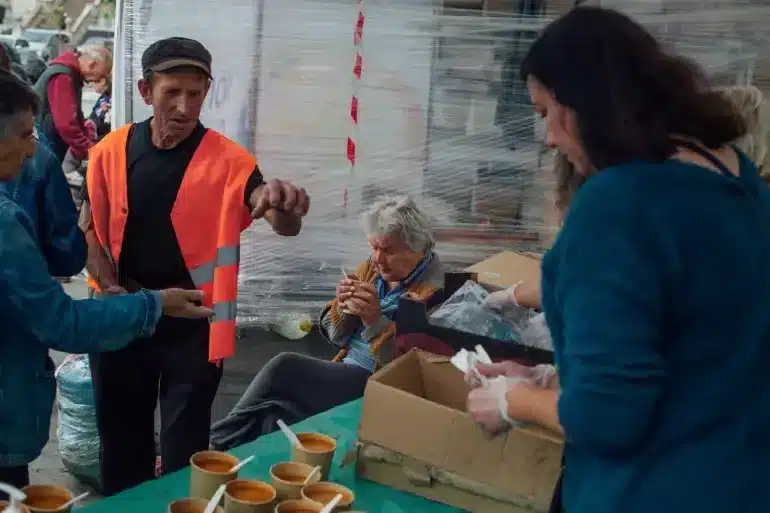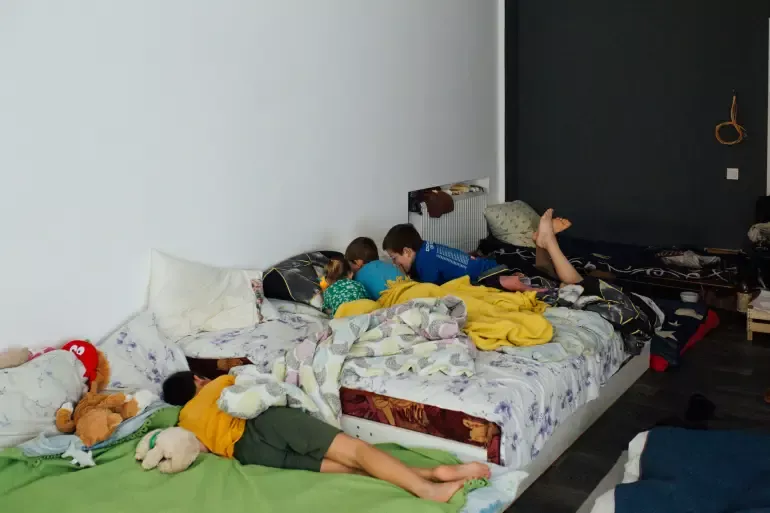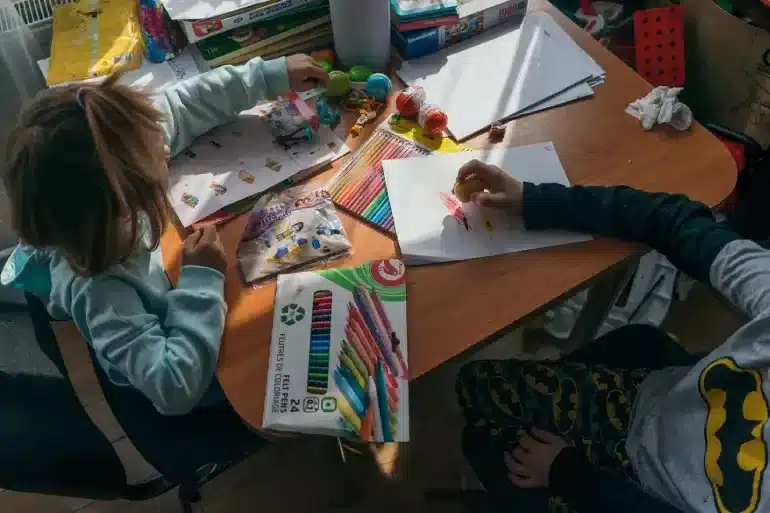Continuing to Care for the Most Vulnerable
Assisting the most vulnerable individuals remains a priority. For example, Fondation de France supports the Ukrainian association Your Support, which manages a shelter with 180 beds in Lviv. Since the beginning of the war, more than 3,200 people, including two-thirds children, have found refuge there. The center provides medical and psychological assistance, as well as employment support. It is currently the only establishment in the municipality that accepts marginalized populations, including Roma people and families with children with disabilities.
To respond to the compounding emergency following the destruction of the Kakhovka dam in June 2023, several partners received exceptional assistance to document environmental damage, distribute food aid and water to flooded populations, and evacuate them to safe locations.

Preparing for the Future and Bearing Witness for Tomorrow
In a context of prolonged war, preparing for reconstruction is a primary goal. The organization National Network of Local Philanthropy Development aims to develop a network of actors who will be involved long-term in reconstruction projects. By encouraging young people to take initiative and develop their civic skills, it fosters the emergence of future leaders who will contribute to the reconstruction of their country.
Preparing for the future is also at the heart of the Docudays project, which conducts awareness and social support initiatives aimed at young people in particular: organizing events like screenings and debates on the subject of human rights and the integration of internally displaced persons within the country. To date, nearly 1,300 events have been organized, with more than 25,000 participants. Communication campaigns also help share this information with a wider audience. Indeed, the dissemination of these narratives is essential to confront an often harsh reality. LHRC Alternative collects personal memories from residents of regions heavily affected by the war. These life stories testify to the changes imposed by the situation on daily life, but also to society’s ability to adapt.

© Fondation de France
Helping the Helpers
To meet the needs of its Ukrainian humanitarian partners and help them continue their missions with the most vulnerable, Fondation de France also works to prevent professional burnout among their teams in the field.
“This war is also a war of attrition, especially psychological,” explains Ingrid Hardouin, Emergency Program Manager. “In Ukraine, due to drone attacks, missiles, and the regular sounding of civil defense sirens, people sleep little. Hence, the professional and emotional exhaustion affecting aid workers.”
This is why Fondation de France supports its partners in psychoeducation and prevention programs for their teams. Indeed, these issues are often underestimated or even stigmatized. It is therefore primarily about convincing those involved of the validity of seeking psychological care.
Actions Supported in Poland, Romania, and Moldova
Fondation de France continues to support several actors in the neighboring countries of Ukraine.
In Poland, the Polish Women Can Foundation promotes the social integration of Ukrainian refugees. The association provides them with computers to enable them to train online or find employment. Special support is given to women and young people through dedicated entrepreneurship programs and courses to improve their digital skills.
The integration of young refugees is also at the heart of the actions carried out by Hope and Homes for Children in Romania. The association organizes holiday camps to offer refugee children in border areas moments of respite. Thanks to the support of Fondation de France, over 400 refugee children and adults have been accommodated.
In Moldova, the association Motivatie provides specific support to disabled refugees: psychological support and adapted transport for people with reduced mobility. The association also raises awareness among other Moldovan actors about the accessibility and employability of refugees, as well as Moldovans with disabilities.

Finally, because the issue of refugee reception concerns several countries, the Carpathian Foundations network (Slovakia, Hungary, and Ukraine) operates at the European level. They carry out communication initiatives aimed at the general public to combat prejudices against Ukrainian refugees and provide material and financial assistance to local organizations serving the most vulnerable.
These initiatives were supported by the generous donations of American donors. Friends of Fondation de France is grateful for your ongoing support, which allows us to provide these important organizations with crucial resources. All donors can continue to make further contributions by clicking the link below. Thank you for being someone who supports humanitarian action.




